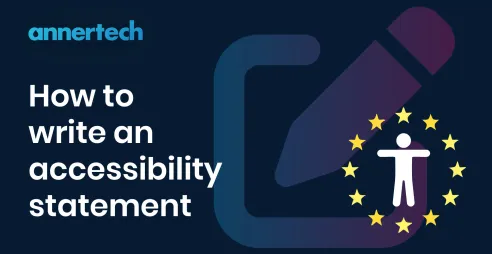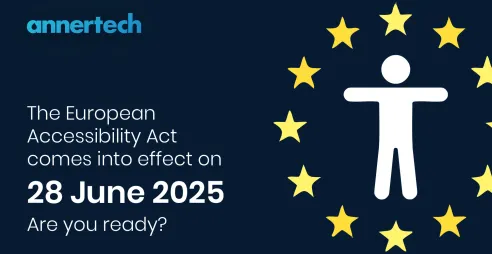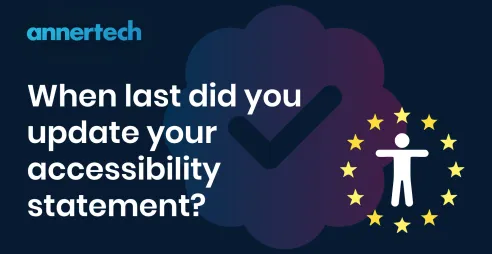The European Accessibility Act is coming next year. Does your website comply?

We have just over a year to go until Irish companies need to comply with the European Accessibility Act (EAA). But what is the EAA and what happens if you don’t conform?
There are a couple of regulations that govern accessibility in the European Union. Currently, the Web Accessibility Directive is only focused on websites and apps in the public sector.
But the European Accessibility Act (EAA) encompasses all web content, products, and services with operations within the EU regardless of ownership. And its ramifications are serious. Those who don’t comply can be sued, or could face fines or jail time.
How are we doing accessibility wise?
Under the Web Accessibility Directive, all relevant public organisations were required to have their websites and mobile apps fully accessible to people with disabilities as of June 23 2021.
The National Disability Authority, Ireland’s national monitoring body, is tasked with monitoring compliance with the EU Web Accessibility Directive. Its 2023 monitoring report shows some progress “by a minority of public bodies” for whom monitoring data is available for both the 2022 and 2023 monitoring periods.
So although there has been some progress, we are almost three years into the directive’s enactment and there is still a way to go.
What is the EAA?
The EAA, which was passed in 2019, takes the web accessibility directive one step further. Its goal is to ensure that products and services within its scope are accessible to persons with disabilities.
So it’s not just public sector products or services that need to comply – it is aimed at all web content, products and services within the EU.
There are exemptions for “microenterprises“, which are enterprises that employ fewer than 10 people and have an annual turnover or balance sheet total not exceeding €2 million.
The EAA has been implemented into Irish law and will apply from June 2025.
With the European Accessibility Act coming into play EU regulations will change, and forward-thinking organisations would probably like to get a jumpstart on the tweaks they will eventually make to their websites. Getting a jump on the changes means that things can be done at a pace that you are comfortable with, and also eliminates a mad dash to a regulation-stipulated deadline.
– Annertech's accessibility advocate Tom Bamford in 'WCAG 2.2 has finally been released. How does this affect you?‘
Are there specific standards?
Although the EAA does not provide any technical accessibility standards that businesses must comply with, it is up to individual member states to decide how they will achieve the aims of any EU directive.
It is assumed that most will choose to adhere to Web Content Accessibility Guidelines 2.1 Level AA, even though these aren't the latest guidelines – WCAG 2.2 guidelines were released in 2023.
Each EU state can decide the penalties and the body in charge of enforcement. The act calls for member states to enforce penalties for noncompliance in a way that is “effective, proportionate, and dissuasive.”
Member states must also make it possible for consumers to report noncompliance, either to the courts or to the body in charge of enforcement in that country, and have the option to go to court or file complaints with the body in charge of enforcement.
Who is in charge of enforcement?
The regulations give enforcement powers to the market surveillance authority, and include the power to issue directions to businesses to comply with its provisions.
The authority in charge of enforcement varies according to whether you’re dealing with a product or service and, more specifically, the type of service in question.
Products
The Competition and Consumer Protection Commission (CCPC) is the market surveillance authority for products that are subject to the EAA.
Services
It gets a little less simple when services are involved. The compliance authorities for services covered under the EAA are dependent on the type of service it is:
- In-scope electronic communications services – Commission for Communications Regulation
- Services providing access to audiovisual media services – Coimisiún na Meán
- In-scope elements of air passenger transport services – Irish Aviation Authority
- In-scope elements of bus, rail and waterborne passenger transport services – National Transport Authority
- Consumer banking services – Central Bank of Ireland
- E-books and dedicated software and e-commerce services – CCPC
- Answering emergency communications to the single European emergency number ‘112’ – Commission for Communications Regulation
The National Disability Authority is also given a special status to advise the relevant authorities on the accessibility requirements under the EAA and the Irish regulations.
Although the regulations are enforced by the market surveillance authority, the EAA allows for private individuals to take action against businesses in the Irish courts where the consumer believes that the business is not complying.
What happens if I don’t comply?
Besides being sued by members of the public, and the negative publicity that would bring, the market surveillance authority can issue directions to businesses to comply with the Act's provisions.
The authority can also apply the following penalties for EAA breaches:
- On summary conviction: A class A fine (€5,000) or imprisonment of up to six months or both.
- On conviction on indictment: A fine of up to €60,000 or imprisonment of up to 18 months or both.
Who can be found guilty?
Both companies and their directors, managers, secretaries and other officers can be found guilty of an offence under the regulations.
Although 28 June 2025 may be a while away, really, accessibility should be at the top of every website owner’s to-do list. Not only is it being enacted into law across the EU, but it makes business sense – and it’s the right thing to do.
– Annertech's accessibility advocate Tom Bamford in ‘Inclusivity moves up the to-do list with European Accessibility Act deadline‘
The gist of it
It’s important to remember that the EAA is about ensuring that products and services are accessible to persons with disabilities. In order to do this, baseline accessibility requirements have been set for products and services that fall within its scope.
You can be sued if your digital content is not accessible. In the US, accessibility legislation has been in place for decades, and there are thousands of lawsuits relating to digital accessibility.
One high-profile case was that of pizza chain Domino’s, which was successfully sued by a man who alleged that the Domino’s website and smartphone app were not accessible for people who use screen readers.
There has been a long lead-in time for companies to make amendments to their products and services and although there is a year to go, it’s best to start sooner rather than later.
It’s not just about avoiding litigation, it’s about making your business available to more people – and who doesn’t want more customers! It’s also about doing the right thing and improving the web for all users.

Is your website accessible?
It is important that work is under way ahead of when the EAA becomes effective in 2025. If this includes your website we can test it to see what needs to be done to make it accessible.
Let us help you


